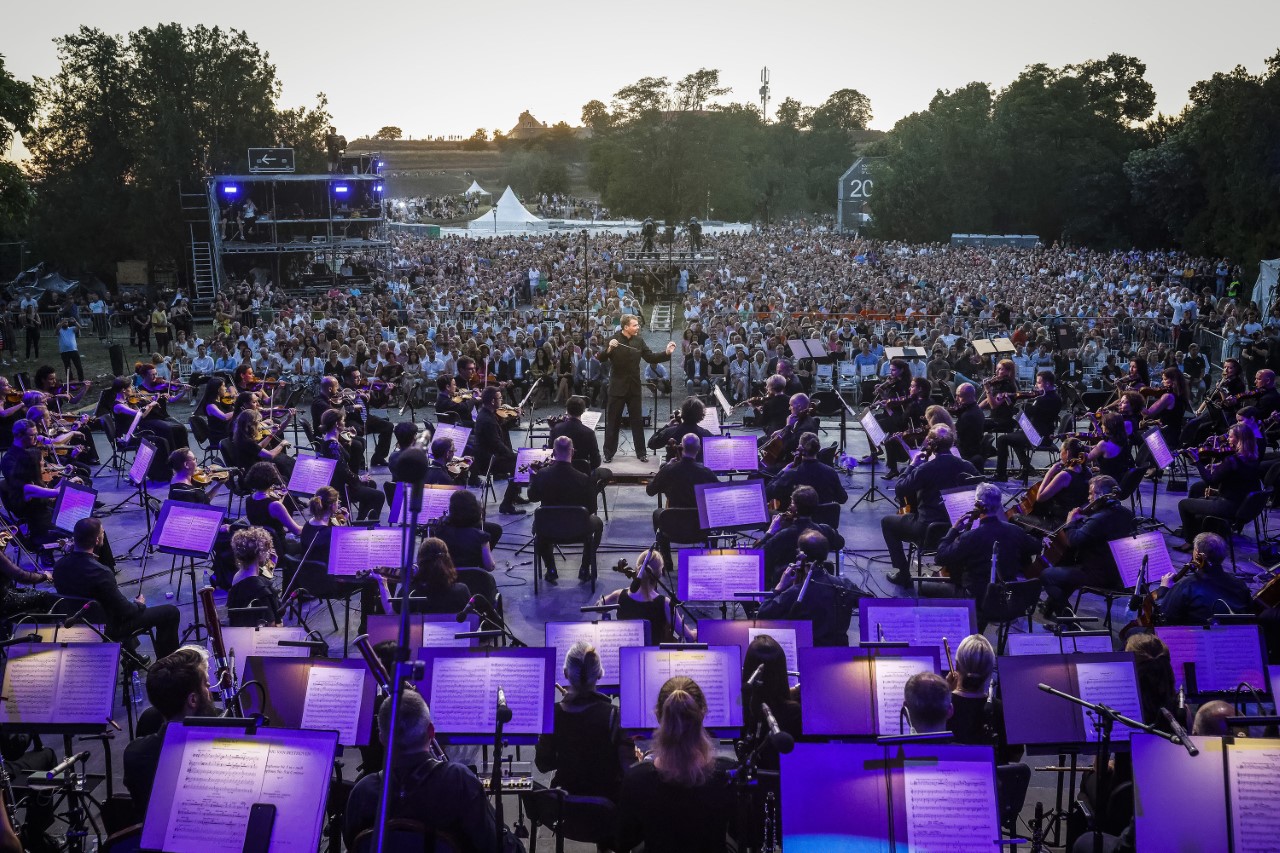All 9 Beethoven symphonies in a day: First review
NewsJonathan Sutherland sat through all nine Beethoven symphonies yesterday in Novi Sad, Serbia. Here’s his review for slippedisc.com:
There were as many violently divergent opinions on this site as to the desirability of performing all Beethoven’s symphonies in one day as the irascible composer’s penchant for insatiable sforzandi.
Yesterday’s herculean marathon performed by German conductor Gabriel Feltz with the Belgrade and Dortmund Philharmonic orchestras in the delightful Serbian city of Novi Sad put paid to any niggardly objections or carping scepticism. This was definitely not a publicity stunt nor crude test of athletic stamina but rather the opportunity to follow the linear and creative progression of one the world’s greatest symphonists over a period of 24 of his most productive years. There was also the unique opportunity to understand a conductor’s interpretative and artistic conception of Beethoven’s symphonies in their totality.
Most Beethoven scholars agree that there was never a single conductor who mastered all nine symphonies with equal perspicacity or definitive interpretative originality. In terms of tempi alone, the Furtwängler/Toscanini divergence is so great that half-hours rather than minutes are involved. Apart from the above, Klemperer, Walter, Böhm, Kleiber, Karajan, Tennstedt and Bernstein all had their respective zeniths but none could be described as the one Lord of the Beethoven symphonic Rings.
Conducting all nine symphonies from memory, Berlin-born Gabriel Feltz displayed an easy affinity for the Haydn-like lightness of the 1st and 2nd but was definitely prepared to unleash the full demonic orchestral forces in the 3rd, 5th and 9th.
The underrated 4th and quirky 8th were impressive in their rhythmic drive. The ornithological references in the 6th avoided being too kitsch. Feltz’s overall tempi tended to be on the fast side, which sounded fresh and virile in most cases but led to a Zander-esque breakneck reading of the 7th which turned the Allegretto into an almost metronomic, pacey pulsation and the final allegro con brio movement into a hurdy-gurdy of frenetic if not manic semiquavers.
Symphonies 1-8 were played in alternating orchestra sets of two over a time period from 10.00-19.00 in the new 400 seat Novi Sad City Concert Hall. While having agreeable sight-lines, it unfortunately has rather dry and sub-resonant acoustics. Colleagues in Dortmund report that the performances there the previous weekend were acoustically much more satisfactory. It was also interesting to compare the sound of the two orchestras which have been moulded by mutual GMD Feltz’s vision of sound and colour.
There is no doubt the creamy string sound of the Belgrade high strings is superior to that of Dortmund which tended to be slightly brittle, despite an excellent double bass section. Conversely the Dortmund winds were generally more dulcet and more attentive to the dynamic markings. Brass in both orchestras were excellent, particularly the raspy Dortmund trombones in the 5th. It seemed most of the audience made a selection of which symphonies they preferred, with not everyone sitting through the complete cycle which to this listener, was the whole point of participating in such a marathon. Somewhat surprisingly, the 2nd, 3rd and 6th received the most applause, although the 5th was played by the Dortmund orchestra with impressive power and laser-crisp rhythmic precision.
The 9th Symphony was an entirely different story and more like an event in its own right.
The two orchestras, plus the Slovak Philharmonic Choir and soloists made an extraordinary visual impact on the enormous purpose-built stage, not to mention generating an enormous sound which was pristinely amplified by state-of-the-art miking and speakers.
Every graduation from pianissimo to fortissimo was clearly distinguishable, which is not always the case with outdoor amplification.
The performance was held in the grounds of the spectacular Petrovaradin fortress overlooking the Danube. This was a free concert which attracted roughly seven thousand attendees, many of whom were clearly not regular classical music concert goers.
Petrovaradin is after all, a venue more famous for its Glastonbury-like rock-concert Exit Festival than the lofty sounds of bassoons and double-basses playing Beethoven.
Whilst the audiences in all previous indoor symphonies were scrupulously attentive, consistently quiet and surprisingly cough-less, most of the evening crowd seemed to have come for the overall experience. There was applause not only between movements but also after the fermata immediately proceeding the Turkish March. Such a thing would never happen in Vienna or Berlin, but before purists start with superior tutt-tutting, the event brought many people to a classical concert in a country which has a somewhat limited history in this genre of music,
Judging by the enthusiasm with which this massive concert was received, there were no small number of converts to classical music as a result.
Gabriel Feltz’s ambitious and expensive project was many years in the making, and was nearly nipped in the bud firstly by the Covid pandemic then the sudden death of one of its leading advocates, the much-loved Director of the Belgrade Philharmonic, Ivan Tasovac. Good German determination and a bit of Slavic serendipity prevailed, and with the added financial support of the EU through the designation of Novi Sad as European Capital of Culture for 2022, this extremely rare event was finally able to take place.
Realisation of the concept had historical significance, and not just for the Balkans.
Previous Beethoven Symphony Marathons only occurred in London in 1988 when Lorin Maazel conducted three major London orchestras and later in Krakow Poland in 2016 when the Capella Cracoviensis orchestra and was directed by 5 different conductors.
Marathons may have their detractors, but to make a culinary comparison, whilst the proof of the pudding may be in the eating, the value of the musical marathon is in the participation.






Comments